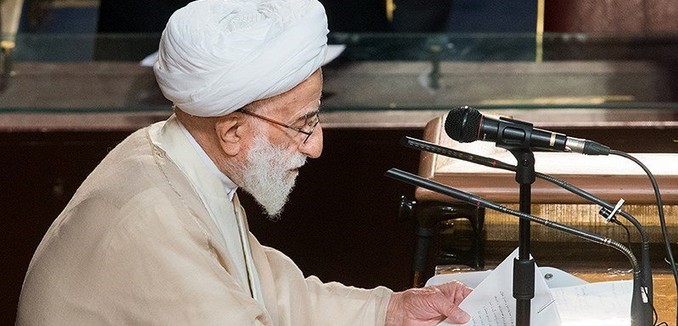The election last week of 89-year-old Ayatollah Ahmad Jannati to head Iran’s Assembly of Experts, which will choose the country’s next Supreme Leader to replace Ayatollah Ali Khamenei, shows that “whoever follows the increasingly frail Mr. Khamenei as Supreme Leader is unlikely to alter the regime’s core anti-Western philosophy,” The Wall Street Journal editorial board wrote (Google link) Monday.
Jannati has proclaimed his commitment to preserve Iran’s “revolutionary” governing philosophy, and also frequently serves as Khamenei’s replacement for leading Friday prayers. His history shows this commitment to the anti-Western founding principles of the Islamic Republic, the Journal wrote, rather than being a force for moderation, which many Western supporters of the nuclear deal had hoped would occur among Iran’s leadership after the agreement was signed last year.
Jannati traveled throughout the Muslim world in 1989 to build support for Ayatollah Ruhollah Khomeini’s fatwa against the life of novelist Salman Rushdie. In 2003, he urged Iraqis to “engage in martyrdom operations” against American troops in Iraq, and six years later said that he hoped that someone would “waste a bullet” on then-Israeli Foreign Minister Tzipi Livni. He has said that the Americans are “the masters of terrorism world-wide and the teachers of terrorists,” while Zionists “have the appearance of humans, but they aren’t humans and have the bearing of pigs and predators.” He also claimed that “the fall of Israel and its fellow travelers is coming.”
Times of Israel editor David Horovitz noted that the U.S. State Department was silent on Jannati’s election to his powerful position, a marked contrast to its criticism of newly-appointed Israeli Defense Minister Avigdor Liberman.
State Department spokesman Mark Toner said last week that Liberman’s appointment “raises legitimate questions about the direction [Israel] may be headed in, and what kind of policies it may adopt.” But when asked by reporters about Jannati’s appointment, Toner said that “we don’t have any comment at this point.”
This was curious, Horovitz wrote, due to the Obama administration’s investment in the nuclear deal and the hope that it would lead to a more moderate Iran.
Given that the United States last year led the diplomatic process that culminated in an agreement to rein in (but not dismantle) Iran’s rogue nuclear program; given that President Barack Obama has been urging Iran to “move toward a more constructive relationship with the world community”; given that Iran is a state sponsor of terrorism and a regional troublemaker; given that Iran continues to develop its ballistic missile program… you might be forgiven for thinking that the selection of the radically hostile Jannati would raise “legitimate questions about the direction” in which Iran may be headed, “and what kind of policies it may adopt.”
Similarly, Tower senior editor Ben Cohen observed last week that Jannati’s election signaled that Iran’s revolutionary regime is preparing to perpetuate itself, not moderate.
Indeed, to disavow Khomeini would be unthinkable in the current context, as demonstrated by the recent election of Ayatollah Ahmed Jannati as head of the “Assembly of Experts,” a key ruling body that chooses the supreme leader.
Jannati is a boilerplate fanatic who leads chants of “Death to America” and “Death to Israel” at Friday prayers. It was Jannati who, in 2009, backed then president Mahmoud Ahmadinejad’s blood-drenched crackdown against pro-democracy demonstrators. The regime that existed in 2009 still exists today, with the same mechanisms of fearsome repression at its disposal. It cannot be reformed, and certainly not from within. But—heretical as it is to say this—it can, and should, be overthrown.
[Photo: Tehran Times ]




